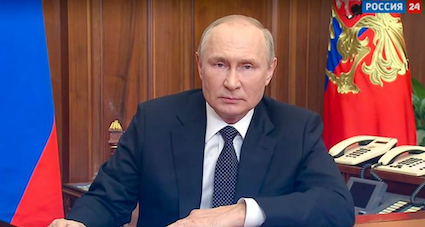President Vladimir Putin on Wednesday ordered Russia’s first mobilisation since World War II and backed a plan to annex swathes of Ukraine, warning the West he was not bluffing when he said he’d be ready to use nuclear weapons to defend Russia.
In the biggest escalation of the Ukraine war since Moscow’s February 24 invasion, Putin explicitly raised the spectre of a nuclear conflict, approved a plan to annex a chunk of territory from Ukraine the size of Hungary, and called up 300,000 reservists.
“If the territorial integrity of our country is threatened, we will without doubt use all available means to protect Russia and our people – this is not a bluff,” Putin said in a televised address to the nation.
Putin said that the West was plotting to destroy Russia, engaging in “nuclear blackmail” by allegedly discussing the potential use of nuclear weapons against Moscow, and accused the United States, the European Union and Britain of encouraging Ukraine to push military operations into Russia itself.
“In its aggressive anti-Russian policy, the West has crossed every line,” Putin said. “This is not a bluff. And those who try to blackmail us with nuclear weapons should know that the weathervane can turn and point towards them.”
The address, showed Putin was doubling down on what he calls his “special military operation” in Ukraine.
Putin signed a decree on partially mobilising Russia’s reserves, arguing that Russian soldiers were effectively facing the full force of the West’s “military machine” in Ukraine.
Speaking shortly after Putin, Defence Minister Sergei Shoigu said that Russia would draft some 300,000 additional personnel out of some 25 million potential fighters at Moscow’s disposal.
The mobilisation, the first since the Soviet Union battled Nazi Germany in World War Two, begins immediately.
Ever since Putin was handed the nuclear briefcase by Boris Yeltsin on the last day of 1999, his overriding priority has been to restore at least some of the great power status which Moscow lost when the Soviet Union collapsed in 1991.
Putin has repeatedly railed against the United States for driving NATO’s eastward expansion, especially its courting of ex-Soviet republics such as Ukraine and Georgia which Russia regards as part of its own sphere of influence.
Putin said that top government officials in several unnamed “leading” NATO countries had spoken of potentially using nuclear weapons against Russia.
He also accused the West of risking “nuclear catastrophe,” by allowing Ukraine to shell the Zaporizhzhia nuclear power plant which is under Russian control, something Kyiv has denied.
Annexation
Putin gave his explicit support to referendums that will be held in coming days in swathes of Ukraine controlled by Russian troops – the first step to formal annexation of a chunk of Ukraine the size of Hungary.
The self-styled Donetsk (DPR) and the Luhansk People’s Republics (LPR), which Putin recognised as independent just before the invasion, and Russian-installed officials in the Kherson and Zaporizhzhia regions have asked for votes.
“We will support the decision on their future, which will be made by the majority of residents in the Donetsk and Luhansk People’s Republics, Zaporizhzhia and Kherson,” Putin said.
“We cannot, have no moral right to hand over people close to us to the executioners, we cannot but respond to their sincere desire to determine their own fate.”
That paves the way for the formal annexation of about 15 per cent of Ukrainian territory.
The West and Ukraine have condemned the referendum plan as an illegal sham and vowed never to accept its results. French President Emmanuel Macron said the plans were “a parody.”
But by formally annexing Ukrainian territories, Putin is giving himself the potential pretext to use nuclear weapons from Russia’s vast arsenal, which has more warheads than even the United States.
Russia’s nuclear doctrine allows the use of such weapons if weapons of mass destruction are used against it or if the Russian state faces an existential threat from conventional weapons.


